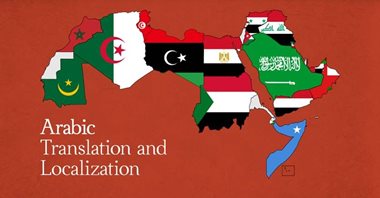American eCommerce on the Rise in the Middle East
One Hour Translation, the translation agency, has released the results of a  study showing the growing demand for American eCommerce websites to ensure they have an established reach with Arabic speaking audiences around the world. In looking at the translation projects completed in their Q1 of 2017, One Hour Translation found that Arabic as a target language accounted for 12.9% of projects, up from 11.8% in 2016. A 1.1% rise may not seem like much, but taking into account the absence of Arabic in their top ten in 2015 as well as years previous, this new presence again establishes the expansive digital transformation, online shopping and eCommerce boom occurring in Arabic speaking countries today.
study showing the growing demand for American eCommerce websites to ensure they have an established reach with Arabic speaking audiences around the world. In looking at the translation projects completed in their Q1 of 2017, One Hour Translation found that Arabic as a target language accounted for 12.9% of projects, up from 11.8% in 2016. A 1.1% rise may not seem like much, but taking into account the absence of Arabic in their top ten in 2015 as well as years previous, this new presence again establishes the expansive digital transformation, online shopping and eCommerce boom occurring in Arabic speaking countries today.
The Rise is Palpable
Yaron Kaufman, co-founder and CMO of One Hour Translation states, “based on the numbers  we’ve collected, the Arab world constitutes an important growth engine for eCommerce companies in the United States and the world. Localization into languages such as Chinese, Spanish, German and French is often the first move toward global expansion made by eCommerce companies based in the United States. The data we’ve mined reveals that many eCommerce websites have already passed this phase of expansion and are now looking for their next growth engines, often finding them in the Arab world and other areas in the developing world.”
we’ve collected, the Arab world constitutes an important growth engine for eCommerce companies in the United States and the world. Localization into languages such as Chinese, Spanish, German and French is often the first move toward global expansion made by eCommerce companies based in the United States. The data we’ve mined reveals that many eCommerce websites have already passed this phase of expansion and are now looking for their next growth engines, often finding them in the Arab world and other areas in the developing world.”
Kaufman further explains his point: “Thus, for example, a report issued by the online payment company Payfort based on data from 2016, entitled 'State of Payment in the Arab World', identified that an average 61% of the population in the seven Arab countries where the company operates engage in online shopping, and projected that the total volume of online transactions in these countries would reach 69 billion dollars a year by 2020, a threefold leap from the volume recorded in 2015.
At the same time, a report by Crimson Hexagon examining millions of conversations conducted in Arabic and English over social media by online users from nine countries in the Middle East and North Africa over the years 2012-2016, identified a growing tendency among these users to purchase products and services on the internet. Among the discussions on shopping, online shopping dominated 75% of the discussions. These reports confirm the growing need felt by American eCommerce companies to expand into the Arab world by translating their websites into Arabic.”
Amazon is Already Making Moves
The staying power of this trend was no more solidified than when Amazon announced it would be purchasing the Middle East’s first eCommerce unicorn in late March. Dubai-based Souq.com, has grown an impressive presence in their marketplace following their move in 2011, to shift their business from an Internet auction site to a retailer and marketplace for third-party vendors. Today, they are a digital commons where consumers have access to about 75,000 brands, with a total number of around two million products spanning 30 different categories of items.
In addition to this marketplace, Amazon is acquiring a retail operation in the Middle East which they previously didn’t have much of, as well as local expertise, which will immensely assist Amazon in dealing with bureaucratic tasks in the region. However, in her article, Venus points out that while these reasons may be attractive, Amazon’s main desire to acquire Souq.com was hinged on something else:
”Even though all of these benefits will help Amazon hit the ground running in the region, the primary reason behind the deal is tapping into the growth in this emerging market. The Middle East is on the verge of a massive digital disruption with significant untapped eCommerce potential, according to a 2016 Digital Middle East report by McKinsey & Company, with eCommerce penetration in the Middle East estimated at a mere 2 percent of retail sales. Another important point about the region is that the market is expected to significantly outpace the growth of the global luxury goods market in the next five years.”
My POV
Its often said in business, if you’re looking for inspiration or feeling stagnant in a saturated market, look for the out of the ordinary, or pay attention to where the key players go that might not make sense to you at the moment, chances are they know things others don’t yet see.
Thanks to this little thing called the Internet, every business now has the chance to become a global brand and should never count out a certain culture or language base, as anywhere could be their next gold mine. As I said, Amazon making such a big splash in entering the Middle East eCommerce market should be reason enough to ensure you have reach to those audiences as well, but the rapid rise in language translation for the Arabic speaking countries around the world shows these consumers are driving their presence in and looking for their options to increase, so the sooner your site can be speaking their language, the better.

Laura Myers
A digital business, marketing and social media enthusiast, Laura thrives on asking unique, insightful questions to ignite conversation. At an event or remotely, she enjoys any opportunity to connect with like-minded people in the industry.